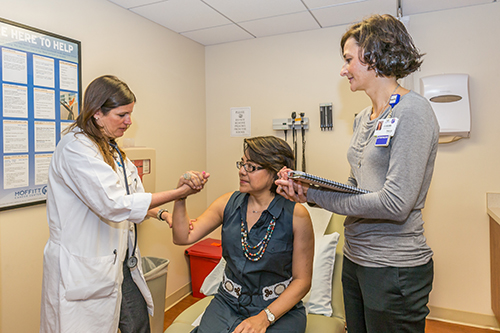Moffitt Speaks to Patients in Their Own Language

At Moffitt Cancer Center, Prado Antolino and her colleagues are showing that language is a powerful tool for helping patients with cancer.
She and other members of Moffitt’s Language Services department provide interpreter services in multiple languages. Clinicians and other Moffitt team members engage these interpreters so patients can discuss their diagnosis and care in their own language.
“It’s the right thing for patients,” said Antolino, language services manager. “When you cannot communicate, when you cannot navigate written or verbal information, access to health care becomes very, very difficult, if not impossible.”
Giving patients access to information in different languages is part of Moffitt’s commitment to health equity. Making sure patients can fully understand and participate in their own treatment helps them overcome barriers to health care.
For Spanish speakers, Moffitt employs several highly trained interpreters who meet in person with patients and their doctors at Moffitt clinics and hospitals.
The Language Services team also works with a company that offers remote video sessions allowing patients to communicate with the cancer center’s medical providers in more than 40 languages, including Arabic, French, Mandarin, Swahili, Yoruba, Portuguese (both European and Brazilian), Vietnamese and many more.
When video sessions are not available, Moffitt offers telephone interpretation in more than 250 languages, ranging from Acholi (spoken in South Sudan and Uganda) to Zyphe (spoken in Myanmar and India).
For patients who are deaf or hard of hearing, the Language Services department schedules interpreters certified in American Sign Language.
Research shows better-informed and more involved patients tend to have better treatment outcomes, Antolino says.
It’s also the law. The U.S. Civil Rights Act of 1964, the Americans with Disabilities Act and the Affordable Care Act all contain provisions requiring federally funded health care providers to offer professional language services.
Moffitt’s Spanish-speaking interpreters are available for patients at especially important appointments such as those where a long-term prognosis or a care plan will be discussed. These Moffitt employees are called oncology medical interpreters and receive specialized training and certification. Ongoing training is essential because as cancer treatment evolves, so does the terminology.
“They have to keep up their skills because cancer care changes very quickly,” Antolino said. “And we have some of the best in the industry, right here at Moffitt.”
For important medical appointments, Moffitt also will reach out to a vendor to offer in-person interpretation in other languages, Antolino added
Video conferences are conducted via iPads. The Language Services team also works with experts who translate important written documents, such as patient discharge instructions.
While Spanish is the most common language other than English, Antolino said her team does notice other trends. For example, the number of people who speak Haitian Creole has been increasing.
“There is a large Haitian population in South Florida, and I think we’ve seen an increase in our own patients now as well,” she said.
Whether the language is Creole, Czech or Cantonese, Antolino says there’s one common thread to all of Moffitt’s language services: There is no cost to patients.
The very first time her team members meet with patients, they let them know, “you will never receive an invoice,” she explained.
“Patients are very grateful.”
George Edgecomb Society eLetter: September 2024
